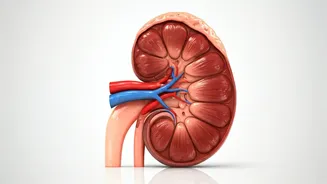Understanding Kidney Role
The kidneys, two bean-shaped organs, play a critical role in maintaining overall health. Their primary function involves filtering waste and excess fluids
from the blood, which are then eliminated as urine. Beyond this, kidneys regulate blood pressure, produce hormones essential for red blood cell production, and maintain the correct balance of electrolytes in the body. They effectively act as the body's natural filters, removing toxins and maintaining a stable internal environment. This intricate system ensures that the body functions optimally by removing harmful substances and maintaining essential elements, making kidney health a central aspect of overall wellness. Understanding these core functions helps in appreciating the importance of taking care of your kidneys.
Healthy Hydration Habits
Adequate hydration is a cornerstone of kidney health. Drinking sufficient water supports the kidneys' ability to flush out waste products effectively. The general recommendation is to drink at least eight glasses of water per day, but this can vary based on factors such as activity level, climate, and overall health. Monitoring the color of your urine is a simple way to assess hydration; pale yellow indicates adequate hydration, while dark yellow suggests you need more fluids. Alongside water, other hydrating options include herbal teas, and water-rich fruits and vegetables. Avoid excessive consumption of sugary drinks, which can contribute to kidney problems. Maintaining consistent hydration is a proactive step in preserving your kidney health, making it an essential daily practice.
Dietary Considerations Explained
The diet significantly influences kidney health, with specific foods offering benefits while others pose risks. Emphasize a diet rich in fruits, vegetables, and whole grains, which are low in sodium and phosphorus and are beneficial. Limit the intake of processed foods, red meat, and sugary beverages, as they can place a strain on the kidneys. Controlling sodium intake is essential to regulate blood pressure and reduce the risk of kidney damage. For those with existing kidney issues, it's particularly important to manage protein intake under guidance from a healthcare professional, as excessive protein can worsen kidney function. Dietary changes should always be tailored to individual needs and health conditions; consulting a dietician or doctor is crucial for developing a kidney-friendly eating plan.
Preventative Measures Explored
Taking proactive steps can significantly reduce the risk of developing kidney problems. Regular health check-ups and screenings are vital, especially for individuals at higher risk, such as those with diabetes, high blood pressure, or a family history of kidney disease. Controlling these underlying conditions is essential for protecting kidney function. Furthermore, avoid the overuse of over-the-counter pain relievers, particularly nonsteroidal anti-inflammatory drugs (NSAIDs), as these can damage kidneys if used excessively. Maintain a healthy weight and engage in regular physical activity to support overall health and kidney function. Quit smoking, as smoking can harm the blood vessels in the kidneys. These combined efforts create a comprehensive approach to protecting your kidneys.
Common Kidney Ailments
Several conditions can impact kidney health, including kidney stones, chronic kidney disease (CKD), and acute kidney injury (AKI). Kidney stones form when mineral deposits accumulate in the kidneys, causing severe pain and potentially obstructing the urinary tract. CKD involves a gradual loss of kidney function, often associated with diabetes and high blood pressure, leading to the kidneys' inability to filter waste. AKI is a sudden decline in kidney function, often triggered by severe illnesses, injuries, or medications. Early detection and management are vital for all these conditions. If you experience symptoms such as changes in urination, swelling in the legs or ankles, fatigue, or blood in the urine, seek immediate medical attention. Regular medical check-ups and prompt treatment can significantly improve outcomes.
Early Detection Importance
Early detection is paramount in managing and treating kidney diseases effectively. Regular health screenings, including blood and urine tests, can identify potential issues before symptoms appear. For individuals with risk factors, such as diabetes or high blood pressure, more frequent monitoring is recommended. Recognizing early warning signs is essential; these may include changes in urination frequency, swelling in the legs, fatigue, or persistent changes in blood pressure. If you observe any of these symptoms, consulting a healthcare professional is crucial. Early diagnosis allows for timely interventions, slowing disease progression and improving the quality of life. This proactive approach underscores the importance of being vigilant about your kidney health and seeking medical advice promptly.
Managing Kidney Disease
Managing kidney disease involves a multifaceted approach, tailored to the specific condition and its severity. Treatment often focuses on controlling underlying conditions such as diabetes and high blood pressure. Dietary modifications, including limiting sodium, phosphorus, and protein intake, are often recommended to reduce stress on the kidneys. Medications may be prescribed to control blood pressure, reduce inflammation, or manage other related conditions. In more advanced stages of CKD, dialysis or kidney transplantation may be necessary to sustain life. Regular monitoring by healthcare professionals is crucial to assess kidney function, adjust treatments, and manage any complications. The key to successful management lies in a proactive approach, including adherence to medical advice, lifestyle changes, and ongoing support from healthcare providers.


















